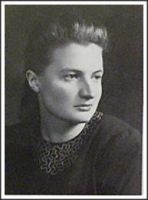Halina Szwarc
»She lived in the shadows, shunned from the limelight, known better only to close associates and friends. She never reached out for awards but bore her head high. In her heart she hid the mystery of her life. «
Piotr Jaworski
Why do I consider this woman to be an important person?
She was one of
the most important agents of the Polish underground during World War II.
After the war, arrested and tortured by officers of the State Security. She
devoted nearly 30 years to elderly people. She founded the first Third Age University in Poland.
Anna Sztaudynger - Kaliszewicz wrote "Halina Szwarc has done more for cheerful, active and creative old age than scientific societies, official and non-governmental institutions. She did a titanic program and organizational work... "
Biography
Halina Kłąbówna was born on the 5th of May 1923 in Lodz. Her father came from a village, and her mother belonged to the middle class of Lodz. Halina was their only child. Her parents lived modestly and frugally, but did not stint money for their daughter's education.
She studied at the renowned school in Lodz, where she proved to be a very capable, hardworking student, with comprehensive interests. At the same time she attended a private conservatory for piano lessons.
At the outbreak of World War II she was 16 years old. Immediately she decided to start working for the underground. A task that she had been entrusted to do could surpass many a grown man.
On the order of her command, referring to her German roots she signed the Volkslist. In a short time she learned the German language perfectly, and in 1942 graduated with honors from the German school in Kalisz.
At the same time she still
carried on her intelligence activities.
In November 1942 she went to Vienna and to
justify her stay in Austria,
she studied medicine. She often traveled all over Reich, carrying on her
intelligence activities. Under Action N she transported press in the German
language to Reich with false appeals of Hitler's army commanders calling to
cease fighting.
To her greatest successes we can include the working out of the air defense in
1943 and positioning of military facilities in Hamburg. This enabled the Allies to destroy
them.
In 1944 she worked at the Central Archives of Military Medicine in Berlin. On the basis of pathological soldiers’ cards she forwarded to the allies invaluable reports on the status and distribution of Nazi troops on the Eastern Front.
In the same year, after returning to the Lodz she was arrested by the Gestapo and imprisoned. Interrogation, torture, brutal and cruel abuse didn’t break her.
She was sentenced to death. Miraculously she was saved by liberation of Lodz on the 17th of January 1945. She escaped from the column of prisoners who were being evacuated.
After the war, she shared the fate of other Home Army soldiers. She was persecuted, humiliated and even arrested. In October 1945 she revealed herself taking advantage of the amnesty.
Following the disclosure she began an almost normal life. She became a medical student in Poznan. In May 1948, she obtained a medical degree.
On the 8th of October 1948 she married a young lawyer - Andrew Szwarc. She was the mother of son Andrew (1951) and daughter Hannah (1958).
Despite persecution by Stalin's regime for her cooperation with the Home Army she was able to continue her career. She received her Ph.D. (1951), associate professor (1966), and in 1984 the title of professor.
She published about 190 scientific papers on endocrinology, sports medicine and gerontology.
In the mid-60 her marriage broke up, and she with her two small children moved to Warsaw. From 1974 she began to specialize in the field of gerontology. She organized the department of Gerontology, in Warsaw.
She found out how much one can do
for elderly people, working in a team consisting of physicians, psychologists,
sociologists and specialists in physical culture.
From 1974 she was a member of the Supervisory Board the Society of Fighters for
Freedom and Democracy.
Using the French formulas, Halina
Szwarc founded the first Polish Third Age University (TAU), which began its
activities on 12.11.1975 in Warsaw.
In the following years she was the initiator of the next TAU: in 1976 in Wroclaw,
Opole 1977, Szczecin
1978 and on 24.04.1979 in Lodz.
Currently there are 380 Third Age
Universities in Poland.
For his bravery and heroic acts during the war, and scientific and social
activities she received military and civilian distinctions.
In 1999, she decided to publish her diary. Till they were issued neither relatives, nor co-workers did not know her wartime past.
She died on the 28th of May 2002 in Warsaw.
Bibliography
- Głowacka Maria, Lechowicz Małgorzata: Więzienie przy Długiej (Gdańskiej) w Łodzi 1885-1953. Łódź: Muzeum Tradycji Niepodległościowych, 2009
- Halina Szwarc, Wspomnienia z pracy w wywiadzie antyhitlerowskim ZWZ-AK, "Neriton", Warszawa 1999
Links
- http://pl.wikipedia.org/wiki/Halina_Szwarc (dostępna 31.07.2013)
- Elżbieta Adamczyk: Życie warte zachodu, Druga rocznica śmierci śp. prof. Haliny Szwarc. "Niedziela (dostępna 31.07.2013)
Picture source
Source: The collection of The Independence Traditions Museum in Łódź
Rights: The consent to publish on the website www.unless-women.eu issued by the museum.




